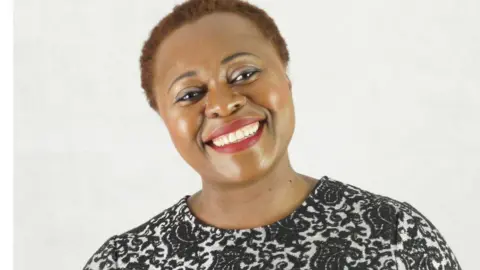Bristol University appoints History of Slavery professor
 Professor Olivette Otele
Professor Olivette Otele The University of Bristol has appointed its first Professor of the History of Slavery.
Professor Olivette Otele, the UK's first black female history professor, will take up the new role in January.
One of her tasks will be to look at the university's and Bristol's involvement in the transatlantic slave trade.
She said she wanted that research project to be "a landmark in the way Britain examines, acknowledges and teaches the history of enslavement".
Much of Bristol's prestige and wealth in the 17th Century came as a result of slave traders such as Edward Colston, whose legacy can still be seen on the city's streets, memorials and buildings.
Professor Otele, who lives in Newport in Wales, became the UK's first black female history professor when she was awarded a professorship and a chair in history by Bath Spa University in October last year.
Speaking about her new appointment, she said: "I hope to bring together Bristolians from all communities, and scholars, artists and educators who are willing to contribute to a stronger and fairer society.
"I want students to see me as a facilitator of a dialogue that needs to take place and that is about the role of the University of Bristol in the transatlantic slave trade."
 Bristol Museums, Galleries and Archives
Bristol Museums, Galleries and ArchivesHer new job will include responsibility for working with staff, students and communities in Bristol to help the university better understand its past and use that knowledge to shape its future.
Provost and deputy vice-chancellor Judith Squires said the University of Bristol was "proud to be appointing someone of Professor Otele's experience and standing".
"As an institution founded in 1909, we are not a direct beneficiary of the slave trade, but we fully acknowledge that we financially benefited indirectly via philanthropic support from families who had made money from businesses involved in the transatlantic slave trade," Professor Squires said.
"This new role provides us with a unique and important opportunity to interrogate our history, working with staff, students and local communities to explore the university's historical links to slavery and to debate how we should best respond to our past in order to shape our future as an inclusive university community."
